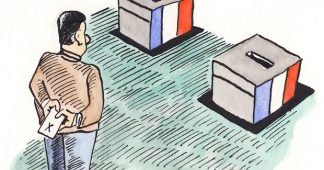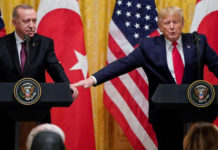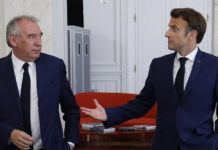By WAYNE MADSEN
The new French president, Emmanuel Macron, who was thrust into the French presidential race as a pro-European Union counterweight to prevent the election of National Front leader Marine Le Pen, appears to have more than a casual relationship with the United States. While he worked within the Ministry of the Economy as both a special inspector and as minister, Macron oversaw the virtual theft of strategic French industries by American firms having strong links to the U.S. Intelligence Community.
The hacking of the computers of Macron’s «En Marche!» campaign movement by unknown parties yielded some interesting material. Defenders of Macron contend that the computer files released were either «fake» or extraneous information. However, one set of files dealing with the virtual theft of France’s top information technology giant by individuals connected to the U.S. Central Intelligence Agency is exactly the type of files one would expect the Macron campaign would keep. Macron’s first job in the French government was to protect the interests of French companies from foreign competition and, most of all, acquisition.
The move by the American intelligence services to acquire French smart card technology leader Gemplus International began in 2001 and the operation was largely complete by 2004, the year Macron became an Inspector of Finances in the French Ministry of Economy. French industry has long been a target for surveillance and/or acquisition by American companies and the CIA has played an important role in such «economic warfare» operations. For example, the French electronics firm Thomson-CSF was long a top target for U.S. National Security Agency and CIA surveillance.
Documents concerning the successful takeover of Gemplus, along with its main factory in Gemenos, Bouches-du-Rhône, France, by an American firm called Texas Pacific Group (TPG) are included in the tranche of files lifted from the «En Marche!» computers. TPG first acquired Gemplus shares in February 2000. In 2006, Gemplus merged with Axalto to form Gemalto and the effective U.S. control of the firm was complete.
In September 2002, Alex Mandl, an American native of Vienna, Austria, and a former President of AT&T, chairman and CEO of Teligent, board member of the CIA’s venture capital firm IN-Q-TEL, and member of the board of the neoconservative American Enterprise Institute, was named CEO of Gemplus International. He continues as the executive chairman of Gemalto.
As a result of the disclosures of former NSA contractor Edward Snowden, it is now known that the British Government Communications Headquarters (GCHQ), working with the NSA, successfully penetrated the SIM cards used by Gemalto. The GCHQ/NSA successfully intercepted mobile communications using encryption-enabled Gemalto SIM cards in Afghanistan, Yemen, India, Serbia, Iran, Iceland, Somalia, Pakistan and Tajikistan. The GCHQ-NSA attack also targeted Gemalto SIM card personalization centers in Japan, Colombia. and Italy. The NSA and GCHQ hack of Gemalto’s SIM chips by their joint Mobile Handset Exploitation Team (MHET) represents perhaps the largest NSA interception operation in history, one that saw billions of mobile calls and text messages successfully intercepted and decoded by NSA and its Bitish partner. More sinister is the inclusion of Gemalto SIM card identification data in the CIA’s database of cell phones targeted in U.S. drone strikes.
«En Marche!» internal documents point to four French government agencies having conducted investigations into the Gemplus takeover. They are the «Renseignements généraux» (RG) (General Intelligence), «Direction de la sûreté du territoire» (DST), the Industry Ministry, and Macron’s Economy Ministry.
The French corporate press, which lavished Macron with praise, a former Rothschild banker, describes the Gemplus documents as having nothing to do with Macron. The French media argues that Macron was a mere student at the elitist French civil service academy, the École nationale d’administration (ENA) until he graduated in 2004. However, as the leaked documents clearly indicate, the Gemplus takeover was still being investigated by the French government when Macron became an Inspector within the Economy Ministry in 2004. Since Macron’s role was to ensure that French companies were free of foreign attempts to stymie French economic growth, his performance, as seen in the loss of French jobs to foreign interests, was abysmal.
It is very likely that En Marche’s files on the Gemplus takeover were to have backup information at the ready in the event Macron’s role in covering up details of the American takeover of Gemplus were to become public. Any political party must be prepared to confront revelations exposed by «opposition research» into their candidates. It is also noteworthy that one of En Marche’s few published policy planks stated it was Macron’s policy to «monitor» but not prevent foreign ownership of strategic French industries and businesses.
In 2008, Macron left government to join the Rothschild & Cie Banque. He also became a leader in the neoconservative-heavy French-American Foundation, which counts among its alum Hillary Clinton, General Wesley Clark, and former World Bank president Robert Zoellick.
The operative question about Macron is: what did he know about the Gemplus takeover and when did he know it? «En Marche’s» Gemplus files, contained in a folder labeled «Macron» and dealing with the American takeover, read like a John LeCarré spy novel.
One file, marked «Confidential», and sent to Stefan Quandt of the billionaire Quandt family of BMW and Daimler fame in Germany, deals with Gemplus’s plummeting stock value in 2001 amid «extremely tense relationship and clashes between the main people at the top echelons, and breakdown of communication with the personnel. As a result, the bulk of them is completely unmotivated today».
As an inspector within the Economy Ministry, it is astounding that Macron would not have been aware of the violation of French law that occurred with the American takeover of Gemplus. This is also described in another Gemplus file from his campaign, which points to the situation regarding Gemplus’s post-U.S. takeover: «Irresponsible statements, often followed by reversals on site closures and firing of personnel, even before consulting with their representatives (as the law and common sense requires)».
The Quandts are very publicity-shy and there is a good reason for it. Guenther Quandt manufactured Mauser firearms and anti-aircraft rockets for the Third Reich. He divorced his first wife, Magde Quandt, after they had one child, Harald Quandt. Magde then married Nazi Propaganda Minister Joseph Goebbels. Stefan Quandt, who was involved in the takeover of Gemplus, is the son of Harald Quandt’s half-brother Herbert Quandt.
The negative information on Gemplus resulted in a January 24, 2002 report from Goldman Sachs that urged the company to continue with its American-directed restructuring to maintain market health. Although he was a student at the ENA at the time, there is scant information on what projects to which Macron was assigned from 2001 to 2003 by his civil service professors.
Other Gemplus-related files in the «En Marche!» folder include those related to one of the principals of Gemplus, Ziad Takieddine, a French-Lebanese Druze arms broker and graduate of the CIA-linked American University of Beirut. Takieddine helped engineer the American takeover with the help of Herr Quandt. Takieddine has helped conclude major French arms deals with Libya, Syria, Saudi Arabia, and Pakistan. Accused of money laundering in the British Virgin Islands by his ex-wife, Takieddine is also the uncle of Amal Alamuddin, the wife of actor George Clooney. Takieddine is also a bitter political foe of former President Nicolas Sarkozy, who lost out in the presidential race in 2017 to rival conservative François Fillon. Macron edged out Fillon in the first round of the presidential election, coming in second ahead of Fillon’s third place finish.
Takieddine, Quandt, and a suspected CIA-linked firm, Texas Pacific Group (TPG), were all clearly part of a conspiracy to get rid of Gemini’s French co-founder Marc Lassus and the firm’s French executives. The decision to fire Lassus and his French colleagues was made at a Gemplus board meeting held in Washington, DC, not in France, on December 15, 2001. Another principal in the American takeover of Gemplus was Lee Kheng Nam, a Singapore business executive and a recipient of an M.S. degree in Operations Research and System Analysis from the U.S. Naval Postgraduate School in Monterey, California. The co-founder of TPG, David Bonderman of Fort Worth, Texas was also heavily involved in the hostile takeover of Gemplus. TPG’s acquisition of Gemplus shares was conducted through a virtually unknown shell company registered in Gibraltar that was called «Zensus». Bonderman, who is Jewish, created a political stir in 2012 in Egypt when he met with Khairat El-Shater, the deputy leader of the Muslim Brotherhood and a member of the Mohamed Morsi government. Bonderman said he was looking for «investment opportunities» in Egypt.
In an undated Word document found in the «En Marche!» computers, Lassus is quoted as saying, «I am convinced that the investment TPG had some kind of agreement with its government to move the head office to California. They tried again in January 2002». The Gemplus workers’ unions predicted the firm’s production would move from France to Poland. The largest French union, «Confédération générale du travail» (CGT), said the takeover of Gemplus was to strip France of its smart card technology leadership. Gemplus employed 7000 French workers before its takeover by the Americans. The undated Word document also refers to French government agencies having «launched inquiries» and sought «internal informers». Did Macron play a role in either the investigations by the Economy Ministry or ratting out Gemplus «internal informers» to his American friends?
When the U.S. firm General Electric took over the French turbine and nuclear technology company Alstom, then-Economy Minister Macron said he approved of such takeovers because «state intervention in industry only happens in Venezuela». That came as music to the ears of the billionaires in the Donald Trump administration.











